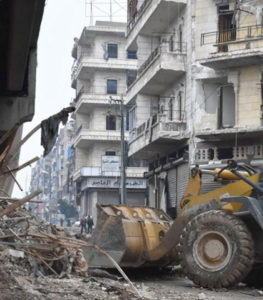Rebuilding Aleppo a slow process
Amid the ruins of the ancient and once beautiful city of Aleppo, people are starting to rebuild their homes.
The residents who haven’t fled are grateful the violence had ended and most want to see a complete end to the war that has blighted Syria since 2011.
But it’s a slow and limited process. Most American and European governments refuse to fund rebuilding on a large scale as long as the government of Bashar al-Assad remains in power.
Before the war, Aleppo was a thriving city with a population of at least 2.3 million. Now, the United Nations estimates there are just 1.6 million people in the city, with 600,000 people returning to the wider province since government forces recaptured the last opposition-held area of east Aleppo in December 2016.
Some estimates say there are only 200,000 people living in east Aleppo, which was damaged on a scale far greater than the west, due mostly to Russian and Syrian government airstrikes at the end of 2016 which were some of the conflict’s most brutal bombing.
The small-scale reconstruction is, of itself, controversial. Even the UN is hesitant to get involved.
A spokesperson said recently in a communique that it is not in a position to fund reconstruction which estimates say will cost hundreds of millions of dollars.
The US is, however, committed to delivering “lifesaving, needs-based assistance and protection services across Syria”.
The UN is also doing “light rehabilitation” work, including repairing water and sanitation infrastructure, and funding other NGOs who are helping with installing new doors and windows. It does not fund the complete reconstruction of private homes.
The Armenian Church Relief Committee has also recently signed an agreement with a French NGO, SOS Chrétiens d’Orient, to help rebuild Christian homes in Aleppo.
The Syrian government is offering compensation but residents say this amounts to just 10 per cent of repairing a home.
Despite the difficulties, some people are returning from overseas. The UN says it expects about 250,000 of the 5.6 million registered Syrian refugees to return this year, largely as a result of pressure from nearby host countries to see refugees leave.
But for many, including people who fled during the war in east Aleppo, return to their homeland is a distant or impossible prospect.
Melbourne based refugee Jamilla Ageed said as a Christian she could never see a time when she would return home.
Aleppo was once a beautiful city and the people of all faiths lived together peacefully,” she said.
“But when the fighting started, we, as Christians, were targeted by extreme groups. These divisions are still there in Syria and for us to go back it would be very dangerous,” Ms Ageed said.
Aid organisations list poverty, destruction, and a lack of basic services as some of the barriers keeping people from returning.
There is also a simmering fear of reprisals. Although the Syrian government has promised amnesty for those who fled Syria to avoid compulsory military service, many do not trust them.
Laurie Nowell
AMES Australia Senior Journalist












